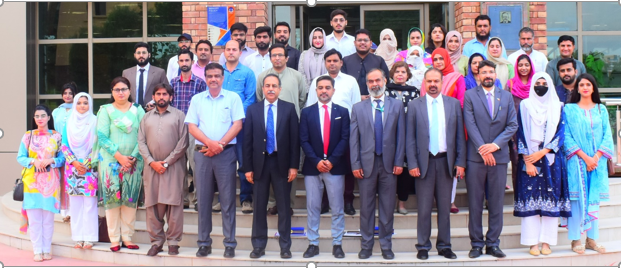Understanding China's reforms and opening-up era: Lessons for Pakistan and way forward

Participants of the forum pose for a group photo. [Photo provided to chinadaily.com.cn]
China Study Centre, COMSATS University Islamabad organized a roundtable on "Understanding reforms and opening-up era - Lessons for Pakistan and way forward" on Wednesday.
The leaders from China Study Centres, Area Study Centres and Confucius Institutes around the country participated as discussants in the round table. The program started with the recitation of Holy Quran, followed by the national anthems of both countries. The inaugural session started with the keynote speeches of Zhang Daojian, professor from Beijing Language and Cultural University, China, Ashfaq H. Khan, professor and dean, S3H, National University of Science and Technology, and Mustafa Haider Syed, Executive Director of Pakistan-China Institute.
The keynote speakers highlighted that the political instability, economic turmoil, and national identity crisis are the impediments in the development of Pakistan. The country should invest in the identity building process in order to create more common communities. The greater interest by the Pakistani people in China Pakistan Economic Corridor is required in order to obtain greater benefit and to make the dwindling number of Special Economic Zones set up by China successfully. Pakistan can learn from the three core factors of policy continuity, political stability and the internal harmony that are intrinsic to China's success in tackling the key issues of unskilled labor, poverty and unemployment.
There was diverse set of opinions put forward by all the experts. The main areas of focus included agriculture, industrialization, defense, science and technology. There is also a need to flourish smart agriculture to ensure sustainable growth of economy through cooperation with China.
Some suggested that China had a people centric approach and valued nationalism. That Pakistan ought to adopt a similar program and should work to make use of the Special Economic Zones set up in lieu of China under the China Pakistan Economic Corridor agreement.
The roundtable emphasized that China has moved from a traditional state to the second largest economy due to its continuous hard work. The similar kind of success is only possible if Pakistan is willing to work hard and to make changes that might be very uncomfortable in the short term.
The political instability, economic turmoil, and national identity crisis are the main impediments in development of Pakistan. The country should invest in the identity building process, increase interest of Pakistani people in China Pakistan Economic Corridor and the benefits associated with it. Pakistan can learn from the three core factors of policy continuity, political stability and the internal harmony. These factors were termed as intrinsic to China's success by the discussants of the roundtable.
Tahir Mumtaz Awan, head of China Study Center, Comsats University Islamabad thanked all the discussants and touched upon the success of China over the last three decades through sharing statistics from the late 1970s till date. He further talked about how China eradicated urban poverty and developed over time. The remarkable achievements in the fields of artificial intelligence and information technology platforms was also among his key discussion points. Talking about Pakistan, he emphasized the low levels of technological development and argued that it is only through technology and its best possible use long run country development is possible.
Muhammad Zamir Assadi, a journalist with Independent News Pakistan.
Photos
Related Stories
- Chinese enterprises donate 250,000 USD to flood victims of Pakistan's SW Balochistan province
- Feature: China's humanitarian aid to Pakistani flood victims testimony of ironclad friendship
- Chinese Red Cross donates 300,000 USD cash assistance for flood-affected people in Pakistan
- China Mobile offers free calls in Pakistan's flood-hit areas
- China's humanitarian assistance for flood victims reaches Pakistan
- Together through rain, heading towards the rainbow
- Pakistani ambassador hails China for being among the first to help as Y-20 aircraft arrived with 3,000 tents for flood-hit ‘ironclad’ brother
- China's humanitarian assistance for flood victims reaches Pakistan
- China to provide more humanitarian supplies to Pakistan: spokesperson
- Xi sends condolences to Alvi over severe floods in Pakistan
Copyright © 2022 People's Daily Online. All Rights Reserved.









